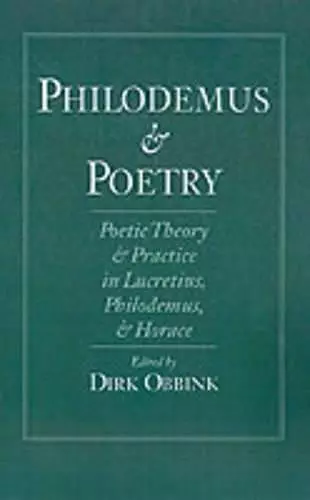Philodemus and Poetry
Poetic Theory and Practice in Lucretius, Philodemus, and Horace
Format:Hardback
Publisher:Oxford University Press Inc
Published:10th Aug '95
Currently unavailable, and unfortunately no date known when it will be back

Building on recent advances in the reconstruction of the charred Papyri of Philodemus excavated from the Villa of the Papyri at Herculaneum, this volume presents eleven new chapters in the history of literary criticism in antiquity. Philodemus of Gadara (c.110-40 BC) shares with his Roman contemporaries Lucretius and Horace the fact that all excelled in the production of poetry, while all three were (at some stage in their careers) adherents of Epicureanism. Designed to offer a critical survey of trends and developments in recent scholarship on Philodemus in particular, and Hellenistic literary theory in general, the essays treat the newly published and re-edited papyrus texts of Philodemus' treatises on poetry and the related subjects of rhetoric and music. In addition, the volume contains a complete translation of a new text of Philodemus' On Poems book 5. The essays evaluate the philosophical and historical importance of these Epicurean treatises and of Philodemus as a literary theorist, and document connections between Greek philosophy and Roman literary production in the first century BC. The recent papyrus discoveries of Ennius, Lucretius, and Posidippus make this volume especially topical. Philodemus was himself a poet of considerable repute. His Epigrams were noticed by Cicero and have been shown to have influenced the poetry of his younger contemporaries Catullus, Vergil, and Horace. As a literary critic, Philodemus embraced a formalism which denied both the moral utility of poems and the separability of content from poetic form. At the same time Philodemus, especially for the benefit of his wealthy patron Piso, sought to demonstrate the convergence of the Epicurean and the traditionally poetic, to show how Homer's poetry, for example, could be seen as providing moral and political paradigms and personal guidance for the potential ruler. How Philodemus attempted to reconcile this position with standard Epicurean views and his own rejection of the moral utility of poetry is a question explored by the essays in this volume.
An extremely useful discussion of the poetics of Philodemus of Gadara ... Highly recommended. * John T. Fitzgerald, Religious Studies Review *
an indispensable tool for scholars beginning to delve into what may be Herculaneum's most valuable treasures * Lee T. Percy, The Episcopal Academy, Bryn Mawr Classical Review 8.2 (1997) *
Obbink is to be commended not only for the sheer labour and diligence which have obviously gone into this work, but also for producing a superbly accurate and accessible edition of an extremely difficult text. The edition will become an essential tool for scholars of Epicureanism and Hellenistic philosophy, and will undoubtedly also be of interest to students of papyrology, philology, ancient religion, Cicero, and the intellectual climate of the first century B.C. Not only has Obbink produced an extremely thorough edition of an important yet intractable text, he has also achieved a high degree of 'transparency' ... he has ensured that the reader, even the non-specialist, is made fully aware as to why choices have been made with the text and the alternatives available. For all of this Obbink is entitled to our gratitude. * Scholia Reviews ns 7 (1998) 4 *
An extremely useful discussion of the poetics of Philodemus of Gadara ... Highly recommended. * Religious Studies Review *
ISBN: 9780195088151
Dimensions: 241mm x 165mm x 25mm
Weight: 655g
336 pages